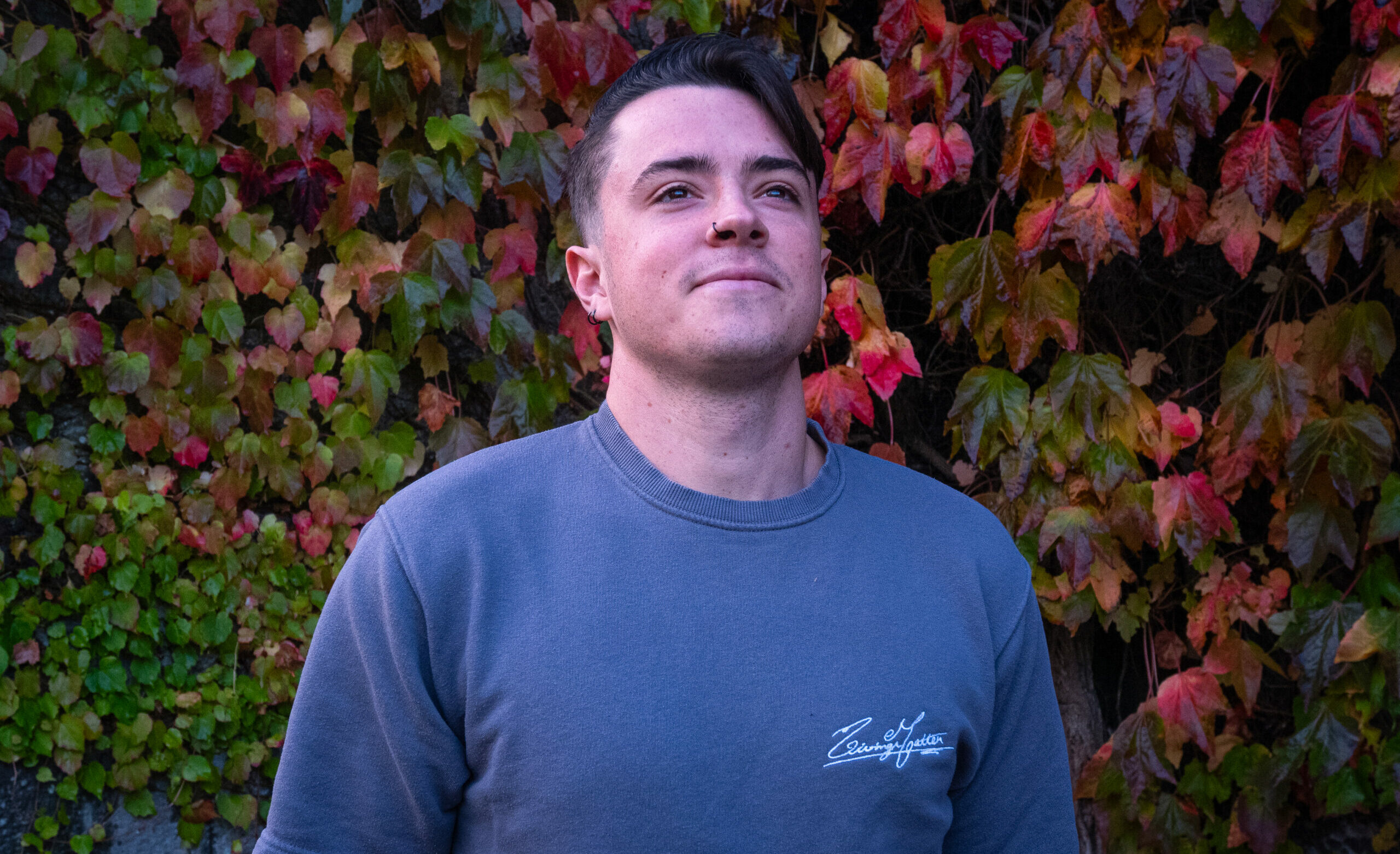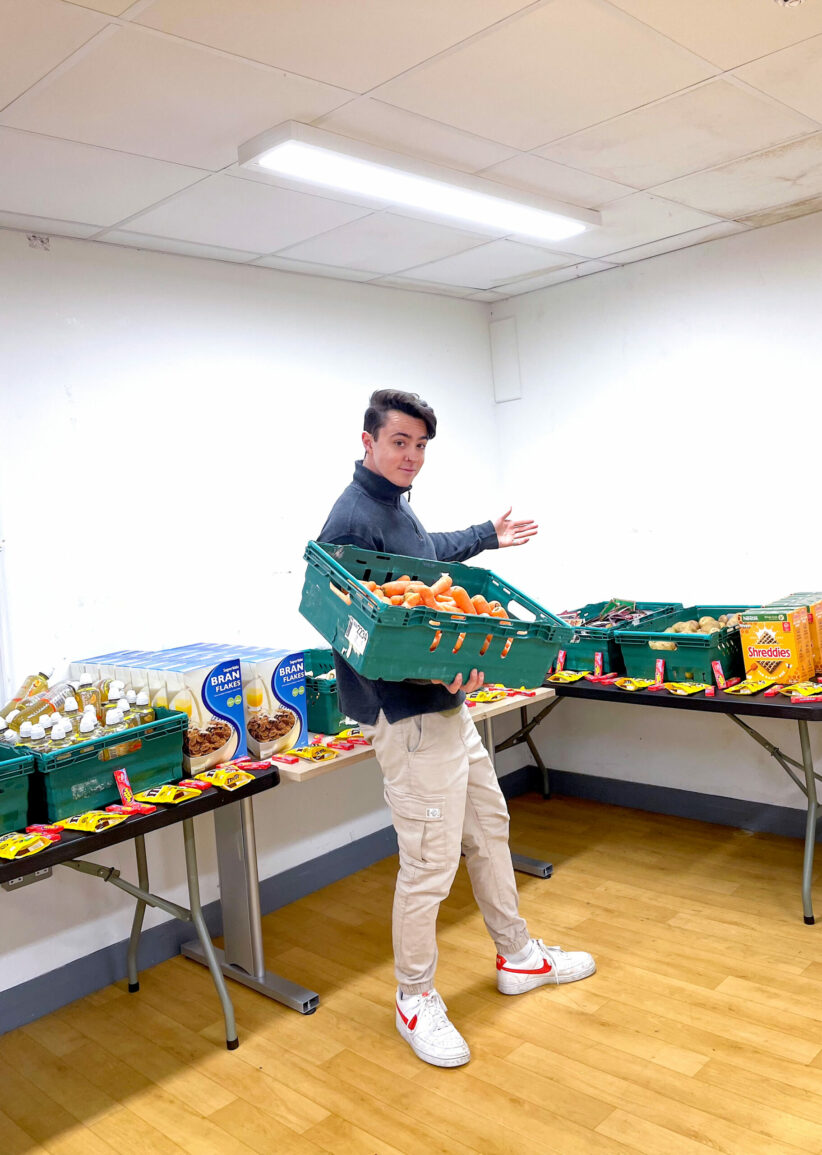
Astrophysics student, Adam Mullins is the founder of The Student Pantry, a student-led solution to food waste and insecurity based in the University of Galway. When 22 year-old Adam isn’t in the lab studying, he is out collecting 1000kg of wasted food items from Galway’s supermarkets to provide free, healthy meals for a growing student population. Here, Meadhbh McNutt sits down with Adam to discuss the importance of removing the barriers to sustainability and food security, and his future plans for The Student Pantry.
Meadhbh McNutt: The Student Pantry is a student-led organisation that is unique to University of Galway. How did this model come about, and can you see this working in other universities?
Adam Mullins: I moved to Galway to study at University of Galway in 2019. Between college, socialising, work and the cost of groceries, I was struggling to get in healthy meals. I had worked on a similar food waste project at home in Donegal, and started to think, “If we have a lot of food waste at home, in the countryside, there must be way more in a city like Galway.” So, I talked with my mum (and my role model), Bébhinn, who manages the Clonmany Community Pantry at home. We talked about the logistics of a similar project in Galway. I reached out to Food Cloud then, a social enterprise set up by two Irish women, Iseult Ward and Aoibheann O’Brien. Food Cloud link me to outlets like Tesco, Lidl and Aldi.

Through Food Cloud, I can get food for the Student Pantry that would otherwise be destined for the landfill. Every meal generated is made up of waste items. We don’t charge, so students availing of the Pantry are making a choice that’s both environmentally and financially sustainable. Sustainable items usually cost more. The aim of the Student Pantry is to remove the barriers to sustainability that exist in society. The Student Pantry is also massively combatting the poverty and housing crisis by reducing student living costs for students.
I see this a super easy option for other universities to pick up. It’s a pipe dream for me, but the goal is to take this model to every university in Ireland, then start looking at other countries. It can be a daunting idea at first, but some other universities have already expressed an interest. I will work with as many as possible once I have the time to develop the Pantry further.
MM: When you finish studying Astrophysics maybe! What does your workday at the Student Pantry look like?
AM: Fridays, Saturdays, Sundays and Mondays are collection days, and I open the Pantry to students on Fridays. To give an example, I usually have a lecture at 9am on a Monday. At 10am, I drive to Lidl to collect food. I drop off the food to the Pantry, do some safety checks, then go to my 11am lecture. After that, I’ll drive to Aldi and go through the same process.
A delivery day involves more work. I arrive at the Pantry at 11am, clean and set up. My delivery arrives at 12pm, and I unload the food and spend three hours setting up. I break down the larger bags of food, and recycle the packaging. We found that students were initially taking bigger bags that would only go towards a couple of meals. So, I now divide large bags into smaller baskets. This means more students are leaving with one meal’s worth, rather than 20 meals’ worth with half going to waste.
The room empties out by 4:05pm. There might be a few Lunchables lying around, so I snack while working. Everyone gives out to me and offers to drop by food but I’m too busy. After clean-up, I go home and eat my first meal of the day at 5pm. I’ll have been up since 8.30am without a single break. I relax at home for a couple of hours before the next set of donations. I accept these before driving around Galway once again for collection. I unload the food again at 9–10pm. Depending on the amount, I could be there from 10 minutes to two hours. Every item I receive has been written off, so safety checks are rigorous. You can’t risk someone’s health. Of all the food I receive, 98% is in perfect condition.
Sustainability is a core value of the university, and that demand came most strongly from students. In semester two, we plan to hire a few students to join the Pantry. One of the best things about teaming up with the Students’ Union is that they don’t pay minimum wage; they pay the living wage. That was a mandatory condition in my head, given all of the free time I’ve put into this. Students take a lot of time out of their busy schedule to contribute, so it’s important that they’re properly compensated.
MM: Can you describe the scale of this project, and the impact for students?
AM: We currently get through over a tonne (1,000kg) of food every week. By the end of the month, we’ll have collected 1.5 tonnes per week which will obviously have a huge impact for students. We see a minimum of 100 students per day at the Student Pantry. On some days, we see 400–500 students lining up. The more food I can get, the more I can serve. At the moment, we have a healthy influx of people who check in every week. The goal is to double the amount of food in our Monday delivery and provide food for at least another 100 students.
Our impact is significant, and not only in terms of cost of living. We are trying to also incorporate health education into the project. We’re partnering with local businesses to provide education on sustainable and healthy meals. I’ve partnered with Jess Murphy from Kai to share recipes on social media, and she’s keen to do more in the future. We now have a wide reach among students; if we can give them free food and healthy recipes, we’re educating students while combating food waste and poverty.
MM: How did you initially get these partners on board?
AM: Shops always have excess waste. We were lucky in the sense that Food Cloud works closely with many supermarket head offices. They have a great relationship with these businesses, and I have a great relationship with Food Cloud. So, it’s a smooth process. More waste means more work for staff, and they hate to see food go to waste. So, I also generally get on well with the staff. Those relationships help when I’m rushing or late to a collection; staff are still happy to see me. Companies are also now mandated by their head offices to be more sustainable. When I first started working with Food Cloud, there weren’t many shops willing to take those measures but now, every Tesco, Lidl or Aldi are obliged to donate.
MM: With the rising cost of living in Galway, are you seeing more students at your doors?
AM: There is an interesting mix of students availing of the Pantry. Some align with our morals while others might drop in for a snack; there is also a huge influx of those affected by this woeful cost of living crisis. There is no hesitation among the students to receive help while supporting a solution to food waste and insecurity.
MM: What advice would you offer students looking to get more involved in their community?
AM: Just do something. If you see a problem, act on it. Speak to people who know more than you about the issue, and learn from them. I have protested and taken part in strikes, and will continue to show up in that way, but a lot of people are afraid to take the next step and act on something. The worst thing that can happen is that you fail or stumble; you’re still moving in the right direction. Protesting only gets you so far. Eventually, you have to take a stand and do something. A lot of people my age think of action in terms of social media. They might post a story on Instagram, but that’s not going to achieve much.
If you feel strongly about something, all it takes to get started is a good problem-solving session. Sit down and try to understand the roots of a problem, the system that surrounds it, then look at solutions/preventions. We often think somebody else will be the person to solve a problem, but sometimes that person has to be you. I have been affected by ageism in my work in my work at times. As a student-run initiative, the Student Pantry’s impact is sometimes underestimated. But you have to take it on the chin, and use it as fuel. As long as your heart is in the right place, the worst-case scenario is a lesson learned.
You can learn more about the Student Pantry here.
SDGs discussed in this article:
Profiles

Adam Mullins is an undergraduate student studying Astrophysics at University Galway. He is the founder of the The Student Pantry, a solution to food waste and insecurity based on the University of Galway campus.

Meadhbh McNutt is an Irish writer, artist and Editorial Manager at University of Galway, where she communicates the depth and breadth of the University's research and impact.
Meadhbh’s previous freelance clients include Douglas Hyde Gallery, TU Dublin School of Creative Arts, Cúirt International Festival of Literature and Galway 2020 European Capital of Culture. She has facilitated sold-out writing workshops at CCA Derry~Londonderry, and in collaboration with Bloomers at the Crawford Gallery, Cork. In 2020, she was awarded the VAI/DCC Art Writing Award, and in 2022, she received an Agility Award from the Arts Council.
You can find Meadhbh's words and photographs in publications/publishers such as Tank Magazine, Rowman & Littlefield, Visual Artists' New Sheet and Mirror Lamp Press.